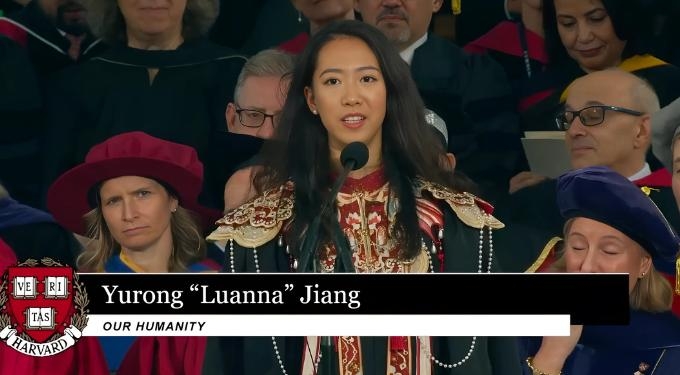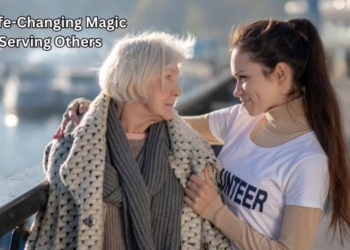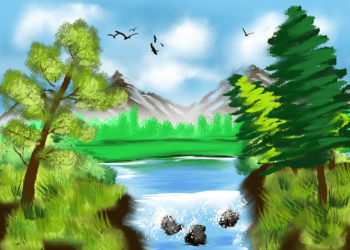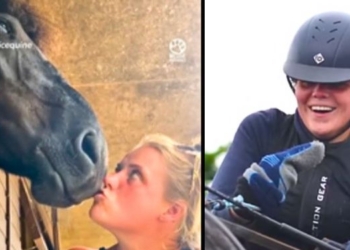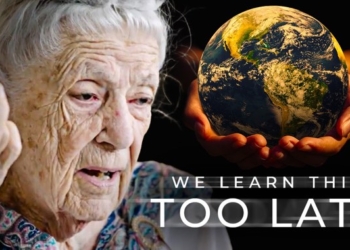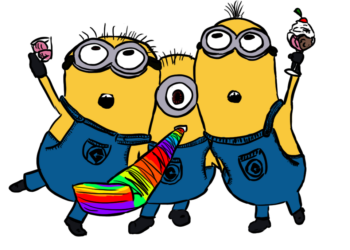Source: Harvard University
Yurong “Luanna” Jiang, a 25-year-old graduate student from Qingdao, China, delivered a powerful commencement speech titled “Our Humanity” at Harvard University's 374th Commencement on May 29, 2025 (the transcript is below). Her heartfelt speech centered on themes of global unity, shared humanity, and resilience in the face of division. She was the first Chinese woman selected to give the Graduate English Address.
Jiang used a humorous anecdote about deciphering a Chinese-labeled washing machine in Tanzania to illustrate how interconnected our world has become. She recalls childhood hopes that this “small village” of humanity would overcome hunger and poverty together, and reflects on how studying international development at Harvard deepened her sense of shared destiny. Yet she warns that rising division and distrust now threaten that vision. Drawing on lessons from her diverse classmates, she urges listeners to “sit with discomfort,” listen deeply, and recognize the humanity of those they disagree with. True progress, she concludes, comes not from proving others wrong but from refusing to let one another go.
SUMMARY
- Opening Story – “Spinning Ghost Mode”
- While interning in Mongolia, she fielded an urgent call from two friends in Tanzania puzzling over a washer whose largest button translated as “spinning ghost mode.”
- The scene—a Thai and an Indian calling a Chinese classmate about Chinese instructions in Mongolia—captures the lived reality of global interdependence.
- Childhood Vision of a “Small Village”
- She grew up hearing that her generation would end hunger and poverty and that the world was shrinking into a close-knit village.
- Harvard’s International Development program embodied that ideal, attracting students committed to collective human progress.
- Transformative Harvard Experience
- Meeting 77 classmates from 32 nations turned abstract map colors into vivid personalities with “laughter, dreams, and perseverance” through Cambridge winters.
- Dancing in one another’s cultural traditions and sharing stories of conflict made global issues intensely personal.
- Personal Stakes in Global Suffering
- Poverty and injustice anywhere diminish us all:
- A woman unable to afford menstrual pads “makes me poor.”
- A girl missing school for safety concerns “threatens my dignity.”
- A child killed by war “takes a part of me with him.”
- Rising Divisions and Misperceptions
- The promise of connection is eroding under fear, polarization, and conflict.
- Society increasingly labels those who vote, think, or pray differently as not merely wrong but “evil.”
- Lessons Beyond Academia
- Harvard’s greatest gift was learning to “sit with discomfort,” listen deeply, and remain soft in hard times.
- Recognizing an opponent’s humanity is the first step to reclaiming our own.
- Call to Action for the Class of 2025
- When the world feels stuck in “spinning ghost mode,” remember everyone we have met—across wealth, poverty, cities, villages, faith, and doubt—now lives within us.
- Progress depends on holding on to one another despite disagreements, bound by a deeper common thread: our shared humanity.
- Closing Congratulation
- She ends by celebrating the graduates and reaffirming that their collective journey continues beyond Harvard, guided by empathy and solidarity.
TRANSCRIPT
Last summer when I was doing my internship in Mongolia, I got a call from two classmates in Tanzania. They had a very urgent question, how to use their washing machine because all the labels were in Chinese and Google kept translating a big button as spinning ghost mode. There we were an Indian and a Thai calling me, a Chinese in Mongolia, to decipher a washer in Tanzania. And we all studied together here at Harvard.
That moment reminds me of something I used to believe when I was a kid: that the world was becoming a small village.
I remember being told we will be the first generation to end hunger and poverty for humankind. My program at Harvard is international development. It was built on this exact beautiful vision that humanity rises and falls as one. When I met my 77 classmates from 32 different countries, the countries I knew only as colorful shapes on a map turned into real people with laughter, dreams, and the perseverance to survive the long winter in Cambridge.
We danced through each other's traditions and carried the weight of each other's walls. Global challenges suddenly felt personal. If there's a woman anywhere in the world who cannot afford a period pad, it makes me poor.
If a girl who skips school out of fear of harassment, that threatens my dignity. If a little boy dies in a war that he didn't start and never understood, part of me dies with him.
But today that promise of a connected world is giving way to division, fear, and conflict. We're starting to believe those who think those who think differently, vote differently, or pray differently, whether they across the ocean or sitting right next to us, are not just wrong. We mistakenly see them as evil.
But it doesn't have to be this way. What I've gained most from Harvard isn't just calculus or regression analysis.
It's to sit with discomfort. Listen deeply and stay soft in hard times. Because if we still believe in a shared future, let us not forget those who we label as enemies. They too are human. In seeing their humanity, we find our own.
In the end, we do not rise by proving each other wrong. We rise by refusing to let one another go. So, class of 2025, when the world feels stuck in spinning ghost mode, just remember as we leave this campus, we carry everyone we've met across wealths and poverty, cities and villages, faith and doubt.
They speak different languages and dream different dreams and yet they've all become part of us. You may disagree with them but hold on to them as we are bound by something deeper than belief: our shared humanity.
Congratulations, class of 202



